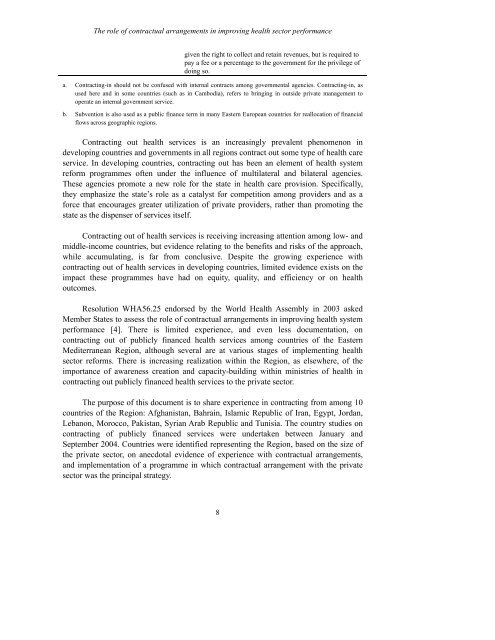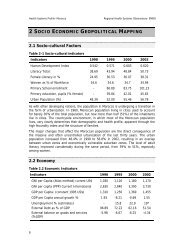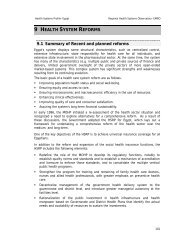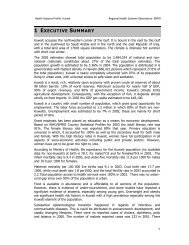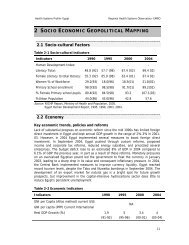The role of contractual arrangements in improving health sector ...
The role of contractual arrangements in improving health sector ...
The role of contractual arrangements in improving health sector ...
You also want an ePaper? Increase the reach of your titles
YUMPU automatically turns print PDFs into web optimized ePapers that Google loves.
<strong>The</strong> <strong>role</strong> <strong>of</strong> <strong>contractual</strong> <strong>arrangements</strong> <strong>in</strong> improv<strong>in</strong>g <strong>health</strong> <strong>sector</strong> performance<br />
given the right to collect and reta<strong>in</strong> revenues, but is required to<br />
pay a fee or a percentage to the government for the privilege <strong>of</strong><br />
do<strong>in</strong>g so.<br />
a. Contract<strong>in</strong>g-<strong>in</strong> should not be confused with <strong>in</strong>ternal contracts among governmental agencies. Contract<strong>in</strong>g-<strong>in</strong>, as<br />
used here and <strong>in</strong> some countries (such as <strong>in</strong> Cambodia), refers to br<strong>in</strong>g<strong>in</strong>g <strong>in</strong> outside private management to<br />
operate an <strong>in</strong>ternal government service.<br />
b. Subvention is also used as a public f<strong>in</strong>ance term <strong>in</strong> many Eastern European countries for reallocation <strong>of</strong> f<strong>in</strong>ancial<br />
flows across geographic regions.<br />
Contract<strong>in</strong>g out <strong>health</strong> services is an <strong>in</strong>creas<strong>in</strong>gly prevalent phenomenon <strong>in</strong><br />
develop<strong>in</strong>g countries and governments <strong>in</strong> all regions contract out some type <strong>of</strong> <strong>health</strong> care<br />
service. In develop<strong>in</strong>g countries, contract<strong>in</strong>g out has been an element <strong>of</strong> <strong>health</strong> system<br />
reform programmes <strong>of</strong>ten under the <strong>in</strong>fluence <strong>of</strong> multilateral and bilateral agencies.<br />
<strong>The</strong>se agencies promote a new <strong>role</strong> for the state <strong>in</strong> <strong>health</strong> care provision. Specifically,<br />
they emphasize the state’s <strong>role</strong> as a catalyst for competition among providers and as a<br />
force that encourages greater utilization <strong>of</strong> private providers, rather than promot<strong>in</strong>g the<br />
state as the dispenser <strong>of</strong> services itself.<br />
Contract<strong>in</strong>g out <strong>of</strong> <strong>health</strong> services is receiv<strong>in</strong>g <strong>in</strong>creas<strong>in</strong>g attention among low- and<br />
middle-<strong>in</strong>come countries, but evidence relat<strong>in</strong>g to the benefits and risks <strong>of</strong> the approach,<br />
while accumulat<strong>in</strong>g, is far from conclusive. Despite the grow<strong>in</strong>g experience with<br />
contract<strong>in</strong>g out <strong>of</strong> <strong>health</strong> services <strong>in</strong> develop<strong>in</strong>g countries, limited evidence exists on the<br />
impact these programmes have had on equity, quality, and efficiency or on <strong>health</strong><br />
outcomes.<br />
Resolution WHA56.25 endorsed by the World Health Assembly <strong>in</strong> 2003 asked<br />
Member States to assess the <strong>role</strong> <strong>of</strong> <strong>contractual</strong> <strong>arrangements</strong> <strong>in</strong> improv<strong>in</strong>g <strong>health</strong> system<br />
performance [4]. <strong>The</strong>re is limited experience, and even less documentation, on<br />
contract<strong>in</strong>g out <strong>of</strong> publicly f<strong>in</strong>anced <strong>health</strong> services among countries <strong>of</strong> the Eastern<br />
Mediterranean Region, although several are at various stages <strong>of</strong> implement<strong>in</strong>g <strong>health</strong><br />
<strong>sector</strong> reforms. <strong>The</strong>re is <strong>in</strong>creas<strong>in</strong>g realization with<strong>in</strong> the Region, as elsewhere, <strong>of</strong> the<br />
importance <strong>of</strong> awareness creation and capacity-build<strong>in</strong>g with<strong>in</strong> m<strong>in</strong>istries <strong>of</strong> <strong>health</strong> <strong>in</strong><br />
contract<strong>in</strong>g out publicly f<strong>in</strong>anced <strong>health</strong> services to the private <strong>sector</strong>.<br />
<strong>The</strong> purpose <strong>of</strong> this document is to share experience <strong>in</strong> contract<strong>in</strong>g from among 10<br />
countries <strong>of</strong> the Region: Afghanistan, Bahra<strong>in</strong>, Islamic Republic <strong>of</strong> Iran, Egypt, Jordan,<br />
Lebanon, Morocco, Pakistan, Syrian Arab Republic and Tunisia. <strong>The</strong> country studies on<br />
contract<strong>in</strong>g <strong>of</strong> publicly f<strong>in</strong>anced services were undertaken between January and<br />
September 2004. Countries were identified represent<strong>in</strong>g the Region, based on the size <strong>of</strong><br />
the private <strong>sector</strong>, on anecdotal evidence <strong>of</strong> experience with <strong>contractual</strong> <strong>arrangements</strong>,<br />
and implementation <strong>of</strong> a programme <strong>in</strong> which <strong>contractual</strong> arrangement with the private<br />
<strong>sector</strong> was the pr<strong>in</strong>cipal strategy.<br />
8


